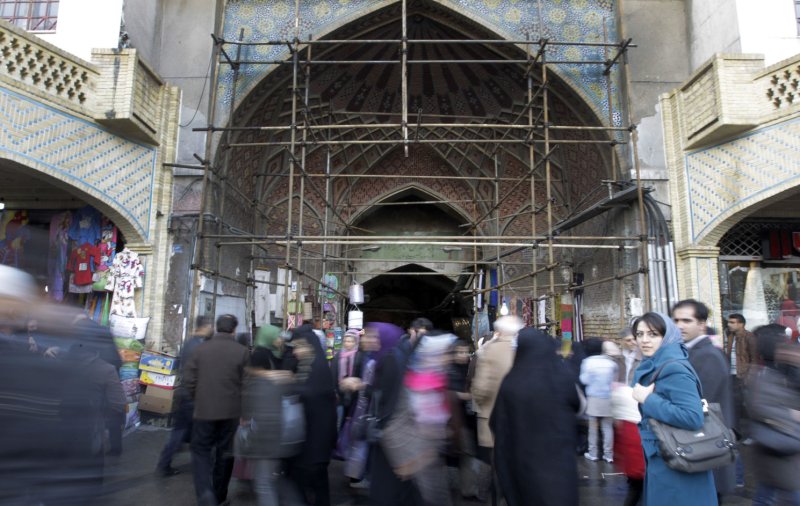1 of 4 | Iranian shoppers pass by the main gate of Tehran bazaar on February 3, 2012. The latest sanctions imposed by Western nations on Iran have caused increase prices on many items and the overall cost of living. Iran says it will not give up its nuclear program and retaliate against any threats. UPI/Maryam Rahmanian |
License Photo
WASHINGTON, Feb. 6 (UPI) -- World concern that Israel could soon launch a pre-emptive strike against Iran's nuclear enrichment facilities is rising amid new bellicose statements from Tehran.
Iranian Supreme Leader Ayatollah Ali Khamenei said a "great event" was coming that would demonstrate Iran's power, and that "the Zionists and the Great Satan" would soon be defeated.
Israel, he added, was a "cancer" that "should be cut and will be cut."
Israeli Vice Prime Minister and Minister of Strategic Affairs Moshe Yaalon said Tehran is building a missile with a distance of 6,000 miles "aimed at America," while Defense Minister Ehud Barak warned that Iran is moving steadily to place its facilities in so-called "immunity zones" -- areas such as underground bunkers and within mountains where they cannot be hit by missiles and bombs.
"The world has no doubt that Iran's nuclear program is steadily nearing readiness and is about to enter an immunity zone," Barak said at a conference in Tel Aviv. "If the sanctions (by the West) don't achieve their goal of halting Iran's nuclear weapons program, there will arise the need of weighing operations."
U.S. Defense Secretary Leon Panetta added to the mix. He was quoted in a newspaper interview as saying an Israeli strike on Iran could come as early as April. Later clarifications of the remarks attributed to him have done little to calm the waters.
The world would certainly appear heading toward an Armageddon of sorts since any armed conflict between Tehran and Tel Aviv would result in repercussions -- at the very least, economic -- for other countries of the region as well as Europe, Asia and the United States.
The heart of the issue is Iran's nuclear program, which it claims is for peaceful purposes. Iran's nuclear interest began decades ago, even before the Islamic Revolution. Interest waned temporarily but revived after the revolution and Russia helped Tehran build a major facility.
It later emerged, from information from Iranian dissidents, that Tehran was building clandestine facilities for uranium enrichment.
The United Nations' International Atomic Energy Agency recently said there are indications Iran has done research on building nuclear weapons, a disclosure that fed suspicions by the United States and European countries, which had imposed economic sanctions in retaliation for Tehran's on-again, off-again cooperation with the IAEA and its steadfast refusal to abandon enrichment efforts.
Iran, however, is now in a corner. The United States and the European Union recently approved economic sanctions Tehran cannot ignore -- in the case of the United States, prescriptions on the country's banking transactions that would cripple Tehran's ability to receive payments for its oil exports, which account for about 80 percent of its foreign exchange earnings and which pay for the regime's social programs. Europe, a major market for Iranian crude, agreed to stop importing Iranian oil from this summer.
Thus the set stage for a violent clash if either side weren't to blink and back down.
Tehran's leaders continue to rattle sabers, threatening to block the Strait of Hormuz in the Persian Gulf -- a major choke point for oil exports from the region, including its own to Asian countries -- on one hand, while also expressing an interest in negotiating a deal with the West, a deal that wouldn't include abandoning its nuclear program.
With European countries facing economic hardship from halting oil imports from Iran, appearances of cooperation could be used to weaken Western resolve. To flat out back down would be tremendous loss of face for a country seeking leadership of the anti-Israel, anti-West Arab masses.
U.S. President Barak Obama, who had opposed the new sanctions insisted upon by Congress, said over the weekend he still preferred carrot to stick. That is obvious by earlier actions by administration officials who have urged Israel to refrain from hostilities.
But while diplomacy is obviously the preferred avenue to rectifying the impasse, Israel may not wait. First, it's very existence is at stake and, as Israeli leaders have noted, Iran could have a nuclear weapons capability very soon. The effect of sanctions would take months before Iran had no choice but to legitimately negotiate a compromise.
Thus each side is in a corner, with Israeli actions the wild card. With relations between Washington and Tel Aviv at low ebb, there is no assurance Israel would give the Obama administration a heads up on impending strikes.





